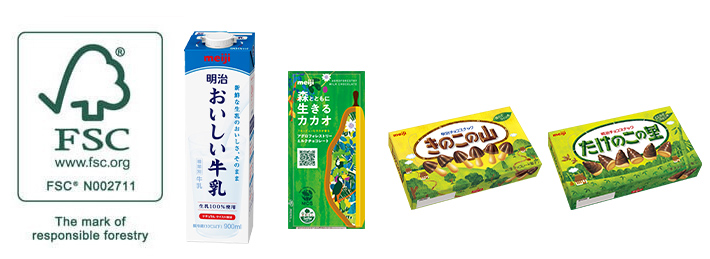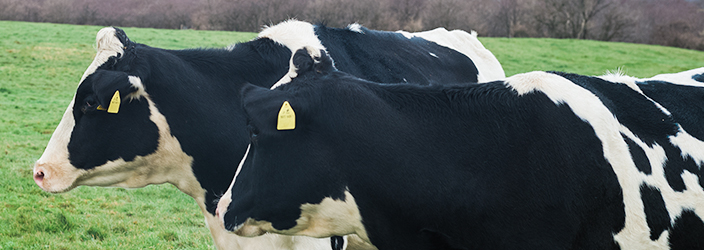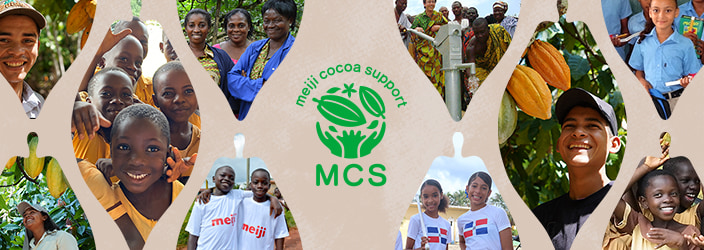Sustainable Sourcing
Targets for Our Sustainable Sourcing Initiatives
Meiji Group 2026 Medium-Term Management Plan
- Data target range or company leading initiatives
- 1: Consolidated subsidaries
- 2: Overseas consolidatd subsidaries
- 3, 10: Consolidated subsidaries in the Food Segment
- 4-8: Meiji Co., Ltd.
- 9: Meiji Holdings Co., Ltd.
- 11: Meiji Holdings Co., Ltd. and its consolidated subsidaries
| Major initiatives | Metrics | Results / progress | Targets | ||
|---|---|---|---|---|---|
| FYE March 2025 | FYE March 2027 | ||||
| 1 | Conduct engagement that includes risk assessments and audits based on the analysis of sustainable procurement survey results | Number of audits conducted on important suppliers | 2 companies | Total of 30 companies or more | |
| 2 | Implementation of risk assessments for overseas group company suppliers | Selected suppliers for risk assessment | 15 companies or more | ||
| 3 | Through Meiji Dairy Advisory (MDA), support the resolution of social issues such as human growth, human rights, animal welfare, and GHG emission reduction through human resource management at dairy farms | Number of farms participating in Meiji Dairy Advisory (MDA) | 56 (total) |
Total of 100 or more | |
| 4 | MilkPromote initiatives aimed at reducing GHG emissions from dairy farming | Number of dairy farms working to reduce GHG emissions | 4 (2,100 head) |
Total of 30 or more | |
| 5 | CocoaExpand the procurement of Meiji Sustainable Cocoa Beans produced in areas where farmers are supported through Meiji Cocoa Support (MCS) | Meiji Sustainable Cocoa Bean procurement ratio | 100% | 100% | |
| 6 | CocoaEstablish traceability through to the farm for all procurement vendors | Rate of traceability through to cocoa farms | 97.7% | 100% | |
| 7 | CocoaPromote efforts toward zero child labor by introducing the Child Labor Monitoring and Remediation Systems (CLMRS), or an equivalent system | Rate of adoption of the Child Labor Monitoring and Remediation Systems | Suppliers in Ghana | 98.7% | 100% |
| All suppliers | 59.4% | 100% (FYE March 2031 target) |
|||
| 8 | CocoaIdentify the conditions on farms through methods such as GPS mapping and promote initiatives aimed at protecting/restoring forests | Rate of ascertaining status using GPS mapping, etc. | Suppliers in Ghana | 91.2% | 100% |
| All suppliers | 88.6% | 100% (FYE March 2031 target) |
|||
| 9 | Palm oilPromote the procurement of palm oil that is not involved in deforestation by incorporating forest monitoring to identify and verify deforestation risks along the supply chain | Number of investigations and corrective actions implemented concerning deforestation caused by palm oil | N/D | 150 cases | |
| 10 | SoybeansEstablish traceability through to the primary collection point | Rate of traceability through to the primary collection point for soy protein isolate | 90.8% | 100% | |
| 11 | PaperMaintain 100% use of environmentally friendly paper for product containers and packaging, and switch to environmentally friendly paper for office supplies and standard publications | Ratio of environmentally friendly paper | Product packaging | 100% | 100% |
| Non-product (office supplies, standard publications) | 99.4% | 100% | |||
Supply chain management
Approach to Supply Chain Management
In recent years, there has been international demand for fair and free competition, fair transactions, and responsible sourcing. Therefore, we should fulfill our corporate social responsibility throughout the supply chain, including both the Group and our business partners. Also, we should address social issues such as child labor, forced labor, and environmental degradation. In the Meiji Group Procurement Policy, we commit to sourcing that considers human rights and the global environment. We will develop responsible sourcing with our business partners and strive to prevent and reduce risks.
The Meiji Group has set forth its procurement activities in consideration of human rights and the global environment in the "Meiji Group Procurement Policy" and is working with suppliers to realize responsible procurement and to implement preventive and mitigating measures against associated risks.
In June 2020, we established the Meiji Group Supplier Code of Conduct, which requires our supplier business partners to fulfill their social responsibilities. Furthermore, in April 2023, we revised this Code of Conduct in order to respond to social issues that have become more diverse as the years have passed.
The Meiji Group Supplier Code of Conduct applies to suppliers of Meiji Co., Ltd., Meiji Seika Pharma Co., Ltd., KM Biologics Co., Ltd. and other domestic and overseas group companies (consolidated).
Additionally, the Meiji Group is engaged as an active member of Consumer Goods Forum (CGF). We are continuing talks with the goal of helping to resolve social issues such as human rights violations and environmental destruction.
Conducting explanatory sessions on the Supplier Code of Conduct
In FY2023, we held explanatory sessions on the Meiji Group Supplier Code of Conduct for domestic suppliers, both in person and online, with a total of approximately 1,100 suppliers participating. We will comprehensively educate our suppliers on compliance matters such as preventing corruption, consideration for the environment, respect for human rights, and ensuring a safe workplace. We ask suppliers to foster a corporate culture where the code of conduct is always top of mind through voluntary internal postings and repeated training. In addition, we require suppliers who agree to the contents of this Code of Conduct to sign and submit a confirmation of agreement. Since FY2024, we have also been working to explain our Supplier Code of Conduct to overseas suppliers and to request the submission of a written agreement, with the aim of further promoting awareness and understanding.
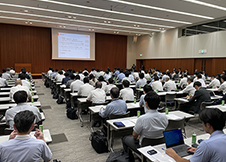
Promoting Supplier Management
Overview of Meiji Group Suppliers
The Meiji Group procures or commissions the manufacture of food and pharmaceutical ingredients, packaging materials, and finished and semi-finished products from approximately 2,700 suppliers globally.
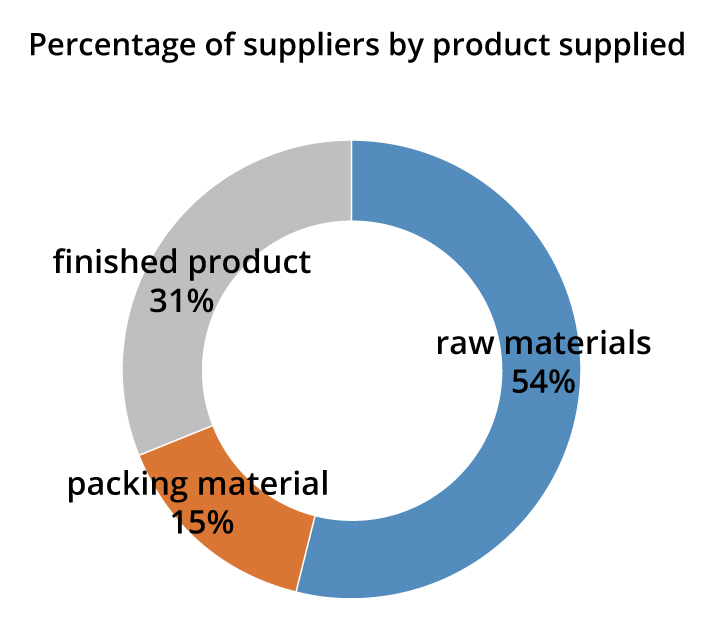
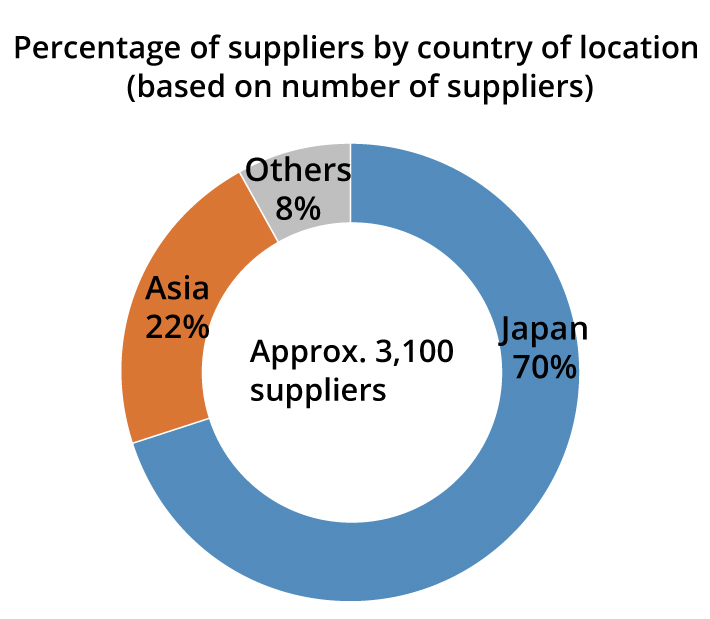
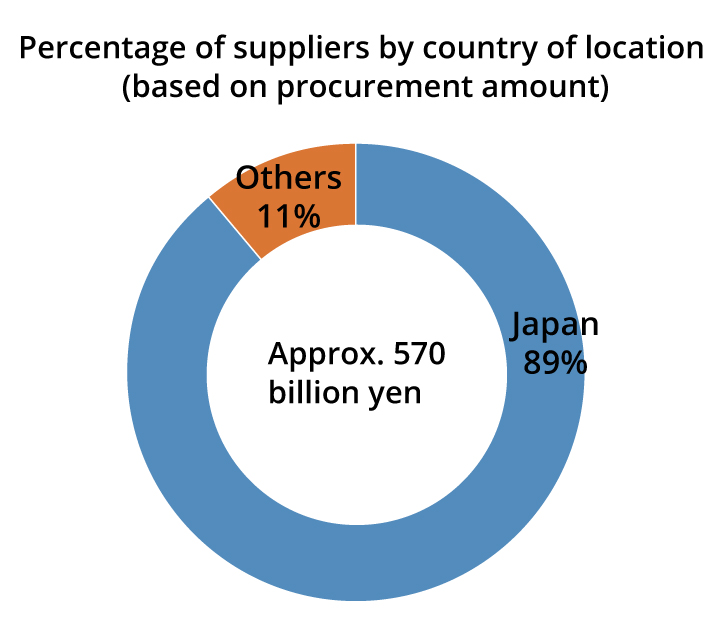
(FY2023 Results)
Meiji Group’s Approach to Supply Chain Management
The Meiji Group promotes supply chain management through the following steps:

◆ Step 1: Supplier Screening
Suppliers are screened from multiple perspectives, including procurement value, environmental, social, and governance (ESG) factors, country-specific risks, sector-specific risks, and product-specific risks. Though this screening process, the Meiji Group identifies suppliers with significant impact on its business.
Out of approximately 2,700 suppliers, 151 have been identified as having a significant impact on the Meiji Group.
◆ Step 2: Supplier Evaluation
For the suppliers identified as having a significant impact on the Meiji Group in Step1, we evaluate their ESG activities using assessment systems provided by EcoVadis and Asuene ESG, which offer comprehensive evaluations of corporate ESG activities.
Evaluation Item
Labor and human rights, safe and healthy work environment, environment, ethics, fairness, sustainable procurement, development of redress system and prohibition of retaliation, etc.
Evaluation Frequency
Once a year
Sustainable Procurement Questionnaire Implementation Results
| FYE 3/2021 |
FYE 3/2022 |
FYE 3/2023 |
FYE 3/2024 |
FYE 3/2025 |
|||||||
|---|---|---|---|---|---|---|---|---|---|---|---|
| Total number of suppliers | Approx. 2,7001 | ||||||||||
| Number of suppliers assessed for risk (Including reassessment) | A single year | 74 | 77 | 33 | 82 | 48 | |||||
| Cumulative total/Percentage of total suppliers | 74 | 2.3%2 | 151 | 4.9%2 | 184 | 5.9%2 | 266 | 8.5%2 | 314 | 11.6%3 | |
◆ Step 3: Supplier Engagement
For suppliers who do not meet a certain score threshold in Step 2, the Meiji Group conducts individual engagement to facilitate dialogue aimed at corrective actions. Through engagement with some of our major raw material suppliers, we confirmed the progress of their initiatives to address environmental issues while mutually sharing our goals and current performance related to reducing environmental impacts such as climate change, water resources, and waste. Through this initiative, we have promoted solutions to social issues such as GHG emissions reduction and water risk. We also conduct engagement with Meiji Group companies in Japan to promote a responsible supply chain.
Number of companies that implemented the program in FY2024
- Suppliers which need to strengthen or improved initiatives: 20 companies
- Major raw material and packing material suppliers: 17 companies
◆ Step 4: Sustainability Audits
If on-site verification is deemed necessary for suppliers engaged in Step 3, a third-party sustainability audit (Workplace Conditions Assessment: WCA)* is conducted. Following the audit, the Meiji Group communicates with suppliers to address and improve any identified issues.
Examples of Aspects Assessed in Sustainability Audits
Social & Labor-Aspects:
Presence of child labor or forced labor, employment contracts, wages and compensation practice, etc.
Environmental-Aspects:
Environmental management systems, waste management, pollution prevention, etc.
Number of supplier audits conducted in FY2024: 2
Sustainable raw material procurement
Sourcing of Raw Milk
The Meiji Group believes that in addition to pursuing delicious milk production, it is also one of essential efforts to support dairy farming that considers the environment and the health of cows.
We implement sourcing with consideration toward human rights, environment and animal welfare, cooperating with suppliers in accordance with the Meiji Group Procurement Policy and the Meiji Group Farm Animal Welfare Policy
As a member of the Global Dairy Platform (GDP) and the Japan National Committee of International Dairy Federation (JIDF), Meiji is working to realize a sustainable dairy industry, and to exhibit the health value of dairy products.
Production, Distribution and Quality Assurance
By closely working with dairy farmers, the Meiji Group is supporting stable and high quality milk production in order to deliver our customers delicious and quality milk.

Traceability of raw milk
We ensure the traceability of raw milk we receive. (domestic and overseas Meiji Group consolidated subsidiaries)
Initiatives for stable sourcing of premium quality raw milk
-
Production sites
- Check feed and environment for breeding cows
- Hold seminars for the milk producers association on raw milk flavor
-
Receiving at plants
- Train taste testers and ensure thorough incoming inspections
-
Research laboratory
- Physical and chemical analysis of properties and ingredients for maintaining and improving quality
- Conduct taste assessment and disseminate information
- Technology development for more accurate and quicker inspections
Supporting dairy farm management with Meiji Dairy Advisory (MDA)
MDA is an activity focused on human resource management, aiding the growth of those involved in dairy farms through improving farm operations and enhancing their business management techniques. MDA is a system for establishing a culture based on the lean production method so that farms can continue to achieve their management goals. Meiji staff members work with farms to devise ideas together, adopting an advisory approach where the awareness of the farm staff is used to build better environments and systems. As continuous improvement progresses, this advisory work will shift its position accordingly.
We have set a KPI to increase the cumulative number of farms participating in MDA to 100 or more by FY2026. We will further strengthen these activities and contribute to the realization of sustainable raw milk production.
| FYE 3/2025 |
|
|---|---|
| Number of farms participating in Meiji Dairy Advisory (MDA) | Total 56 |
Sourcing of Cocoa
The field of cocoa production has issues such as aging trees, disease and insect damage, difficulties in obtaining agricultural materials, and lack of familiarity with cultivation techniques have led to a decline in harvests, resulting in inadequate income. And in some countries and regions cocoa farmers also face social issues such as child labor and deforestation. Meiji's mission is to improve this situation, make cocoa production sustainable, and ensure the stable delivery of delicious chocolate.
The Meiji Group aims to achieve a 100% procurement of "Meiji Sustainable Cocoa Beans" produced in areas where farmer support has been provided by FY2026. Based on the "Meiji Group Procurement Policy", we are working with suppliers and conducting procurement in consideration of human rights and the environment to solve issues faced by cocoa bean production areas and farmers, contribute to make cocoa production sustainable.
| Unit | FYE 3/2021 |
FYE 3/2022 |
FYE 3/2023 |
FYE 3/2024 |
FYE 3/2025 |
|
|---|---|---|---|---|---|---|
| Procurement ratio of Meiji Sustainable Cocoa Beans | % | 40 | 42 | 62 | 62 | 100 |
- 2024 Achievement of Meiji Cocoa Support Program
- 2023 Achievement of Meiji Cocoa Support Program
- 2022 Achievement of Meiji Cocoa Support Program
Meiji Cocoa Support
“Meiji Cocoa Support” is our unique cocoa farmer support program that began in 2006. We are aiming to enhance the sustainability of cocoa bean production by directly visiting production areas and working with various partners to address social issues. These issues include technical support to improve the quality of cocoa beans, improving the livelihoods of farmers and activities to conserve and restore the local environment.
We purchase cocoa beans at a premium price when procuring them to maintain and promote this activity.
Support for cocoa producing areas
Meiji Cocoa Support currently operates in nine countries. The challenges faced vary depending on the country or area where cocoa is produced. Meiji faces each of these challenges and provides the optimal support required by the production areas to resolve them.
Efforts to Establish Traceability
Sustainable cocoa production requires addressing social issues such as child labor and deforestation, starting with an accurate understanding of the production area. As the first step in this process, Meiji is advancing efforts to establish traceability down to the farm level.
Efforts to Eliminate Child Labor
In Côte d'Ivoire and Ghana, an estimated 1.56 million children are engaged in child labor in cocoa producing areas. Meiji is working with local partners and communities to eliminate child labor.
Efforts to Stop Deforestation
Aiming to balance cocoa production with the richness of nature.
We are involved in a variety of initiatives, including education related to forest protection and restoration, and promotion of agroforestry.
Sourcing of Palm Oil
Palm oil is a plant-based oil derived from oil palms cultivated in the tropics, and is widely used in the production of processed foods. Major producer nations of palm oil face human rights issues such as forced labor and child labor. These countries also face environmental issues such as deforestation and the destruction of peatland areas due to the development of agricultural land.
Our Meiji Group Procurement Policy outlines our support for the NDPE Policy to No Deforestation, No Peat (i.e. no development in peatlands) and No Exploitation. We are committed to working with our business partners to fulfill our corporate social responsibility by engaging in eco-friendly sourcing of palm oil.
Shifting to Certified Palm Oil
Meiji Group joined the Roundtable on Sustainable Palm Oil (RSPO) in 2016. By October 2022, 18 of our domestic plants, as well as 5 of our overseas plants, hold RSPO supply chain certification. As of FY2023, We have achieved 100% procurement of RSPO-certified palm oil using the mass balance method.
From FY2024, in order to further resolve social issues, we will verify the risk of deforestation in our supply chain through forest monitoring and promote the procurement of palm oil that is not related to deforestation.
Additionally, we are also asking our contractor to which we outsource our manufacturing activities for priority use of RSPO-certified raw materials by asking their understanding and cooperation regarding environmental impacts.
As a member of Consumer Goods Forum's (CGF) Japan Sustainability Local Group (JSLG) we are collecting and sharing information concerning certification systems, as well as issues at palm oil production sites. In 2019, we observed plantations in Malaysia-a major producer of palm oil.
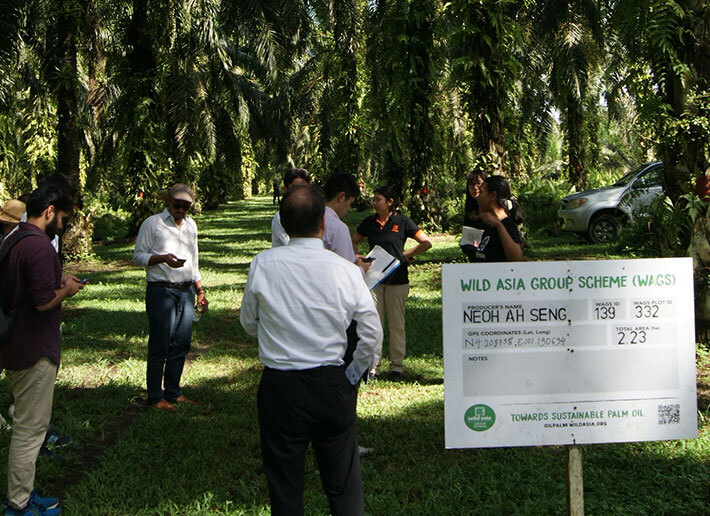
We visited plantations in Malaysia, a palm oil-producing country, twice in FY2019
| Unit | FYE 3/2021 |
FYE 3/2022 |
FYE 3/2023 |
FYE 3/2024 |
FYE 3/2025 |
|
|---|---|---|---|---|---|---|
| Ratio of Certified Palm Oil* | % | 68 | 84 | 90 | 100 | 100 |
Confirmation of Palm Oil Traceability
To ensure that deforestation, peatland development and exploitation are not occurring in the palm oilproduction areas, we regularly obtain traceability information from our suppliers to the oil mills and publish a list of mills.
Sourcing of Soybean
Soybeans are widely grown and used as food materials around the world and are used for a variety of purposes other than food, such as feeding livestock. Soybeans are one of the most important raw materials for the Meiji Group's business, but issues related to deforestation and human rights caused by overdevelopment of plantations have been pointed out, particularly in Brazil. Based on "Meiji Group Procurement Policy", the Meiji Group will engage in socially responsible soybean procurement activities in collaboration with supply chain partners.
Sourcing of Paper
Following the Meiji Group Procurement Policy, we are working with our suppliers to procure paper raw materials for product and office use in ways that care for human rights and the environment.
Expanding Use of Eco-Friendly Paper
We have promoted the use of FSC®* and PEFC-certified paper, as well as post-consumer paper for use in product containers, packaging, printing and copying.
By FY2023, we achieved 100% use of environmentally friendly paper raw materials for the paper used in the containers and packaging of products produced across the Group. As well as product packaging, we are continuing to expand the use of environmentally friendly paper for office supplies (business cards, envelopes, paper bags, etc.) and periodical publications (company brochures, etc.).
| Unit | FYE 3/2021 |
FYE 3/2022 |
FYE 3/2023 |
FYE 3/2024 |
FYE 3/2025 |
||
|---|---|---|---|---|---|---|---|
| Ratio of environmentally friendly paper | Product packaging | % | 77 | 98 | 98 | 100 | 100 |
| Non-product (office supplies, standard publications) | % | - | - | - | - | 99 | |
Expanding usage of FSC®-certified paper in our mainstay products
We are making use of eco-friendly paper in many of our products, including "Meiji Oishii Gyunyu 900ml,""Kinoko no Yama," and "Takenoko no Sato."
Additionally, Meiji Co., Ltd. obtained COC certification (License number: FSC®-C159538)* for our yogurt and chocolate production processes in October 2020, with the goal of increasing our usage of FSC®-certified paper.
-
Link
- FSC®
